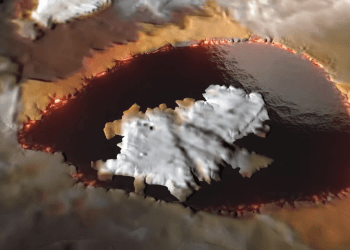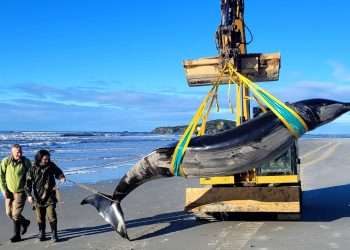FOUR astronauts have successfully landed on the International Space Station (ISS) today ahead of a six-month science mission.
With the help of SpaceX, Nasa has placed three of its own astronauts and one Roscosmos cosmonaut on the orbital outpost, where they will remain for the next 180 days.

Russian cosmonaut and mission specialist Alexander Grebenkin (L), and Nasa astronauts pilot Michael Barratt (2nd L), commander Matthew Dominick (2nd R), and mission specialist Jeanette Epps (R)[/caption]

Crew-8 plan to do various experiments aboard the ISS[/caption]
The crew includes Nasa astronauts, Matthew Dominick, Michael Barratt, and Jeanette Epps, alongside Russia’s Alexander Grebenkin.
Space is one of the final frontiers that the US and Russia continue to cooperate in.
The successful launch from Nasa’s Kennedy Space Centre in Florida at 10:53pm ET (3:53pm GMT) today, marks SpaceX eighth Nasa Commercial Crew flight to the ISS.
It’s not an impact to Crew-8, but I didn’t want anybody to be surprised.
Joel Montalbano, ISS Program Manager
It takes roughly four hours to reach the ISS after launching from Earth.
The mission endured a rocky start when two previous launch windows were scrubbed over strong winds.
Despite a small crack on the hatch seal, engineers determined that it wouldn’t present enough of an issue to abort the launch a third time.
Crew-8 plan to do hundreds of experiments aboard the ISS, including growing artificial replicas of human organs to study how microgravity effects degenerative diseases.
Nasa’s goal is to gather more information of how humans will fare in space in the long-term, as it vies for a permanent lunar base on the south pole of the Moon.
The crew will also experiment with pressure cuffs on legs to see whether they alleviate any health problems.
Humans in space lose between 1 and 1.5 per cent of their mineral bone density.
Although ISS astronauts spend an average of two hours a day exercising, muscle loss is unavoidable in space.
It takes several years to recover from a six-month spaceflight and the physical impacts it causes on the human body, such as the redistribution of fluid and muscle atrophy.
Leaky ISS
It comes just days after Nasa administrators admitted that a leak in the Russian segment of the ISS has doubled in size since its discovery several years ago.
“It’s not an impact to Crew-8, but I didn’t want anybody to be surprised,” ISS Program Manager Joel Montalbano said at a Crew-8 mission briefing.
He added that managers don’t believe the leak will affect crew safety but that “teams are watching it.”
The ISS is getting old – and by the end of the decade, it will need to be pulled from orbit to meet its watery grave in the ocean.
Fortunately, Nasa has been preparing for this for some time.
In December 2021, the US space agency announced it was awarding a total of $415million (£326million) to three different companies — Blue Origin, Nanoracks (plus Voyager Space) and Northrop Grumman — to help cement their commercial space station concepts.
NASA also has a separate agreement with Texas-based Axiom Space, which is working on its own private outpost as well as a new series of spacesuits.
While Voyager has officially mapped out how it’s going to get Starlab into orbit – Blue Origin, in collaboration with Sierra Space, is in test mode for its own outpost.
In September, Blue Origin’s ISS replacement exploded in a fifth intentionally destructive test.
The test was designed to tech both companies how to build a space station that won’t fatally explode in orbit.
Northtop Grumman had initially had its own plans for a space station when Nasa funded it.
However, the company dropped its idea in October, to assist Voyager Space with Starlab instead.
Find out more about science
Want to know more about the weird and wonderful world of science? From the Moon to the human body, we have you covered…
- When is the next Full Moon?
- What is a Super Moon?
- What is SpaceX?
- Where is the edge of space?
- How many bones are in the human body?
- How many chromosomes do humans have?
- What causes a volcano to erupt?
- Which sharks attack the most humans?
- What are the conspiracy theories about the world ending?
- All the UFO sightings and whether aliens are real
- Which country has the most earthquakes?
































